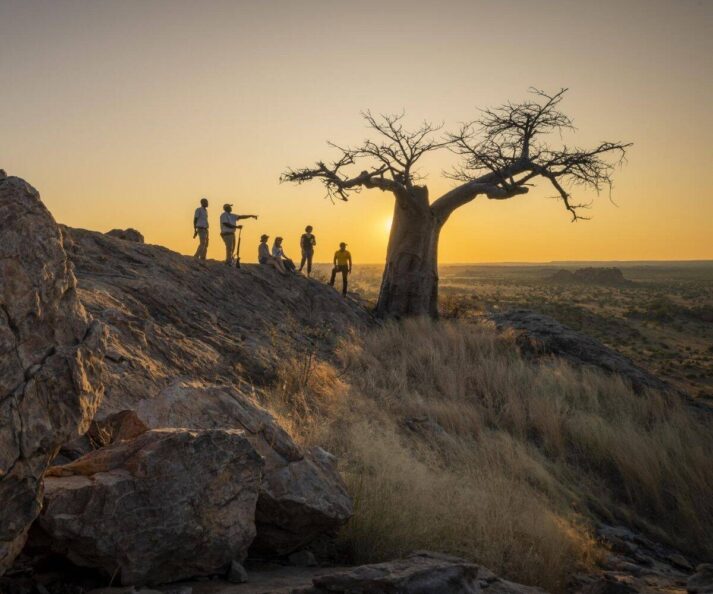Discovering Africa: The Rise of Walking Safaris
Exploring the vibrant landscapes of Africa on foot offers travelers a unique way to connect with nature and immerse themselves in diverse ecosystems. Walking safaris, a popular choice among adventure seekers, allow participants to experience the subtle details of their surroundings, fostering a deeper appreciation for wildlife and the environment.
The Allure of Walking Safaris
Walking safaris present a chance to step away from the traditional safari vehicle, creating a sense of inclusion in the landscape. This method of exploration encourages travelers to engage all their senses and observe elements often overlooked from a distance—such as fresh animal tracks, the scent of local flora, or the sounds of wildlife.
Heightened Connections with Nature
Being on foot allows individuals to interact more intimately with the environment. As one can appreciate the nuances of the natural world—like the rustling grass when the wind blows or the distant calls of birds—travelers can develop a stronger bond with the land. Notable highlights include the thrill of coming across small wildlife and beautiful plants, which can often be missed during vehicle tours.
The Thrill of Adventure
Walking safaris not only provide a unique adventure but also engage one’s primal instincts. A sense of vulnerability arises from being on the same ground as majestic wildlife, such as elephants or lions (at a safe distance), leading to authentic and exhilarating encounters. Multiple locations throughout Africa facilitate these adventures, creating memorable experiences.
Key Walking Safari Destinations
Here are some top destinations for hiking enthusiasts looking for an adventurous way to explore Africa:
1. WalkMashatu in Botswana
Mashatu Game Reserve, dubbed "The Land of the Giants," features diverse landscapes, including lush river forests and sandstone outcrops. The WalkMashatu experience is led by expert trackers who guide guests through ancient trails and help them identify various flora and fauna. After a day of exploration, guests indulge in starlit camping experiences, bridging the gap between adventure and tranquility.
2. Onguma Trails in Namibia
Situated alongside Etosha National Park, Onguma Trails Camp allows guests to traverse big game country. The guided hikes range from 6 to 8 km daily, focusing on animal tracks and flora during Namibia’s cooler months. Here, visitors stay in glamping accommodations that blend comfort with adventure, all while immersing themselves in the stunning wilderness.
3. Babanango Game Reserve in South Africa
In KwaZulu-Natal, Babanango Game Reserve offers a rich biodiversity backdrop. Walking safaris navigate the rugged hills and grasslands, providing insights into essential bushcraft skills. Guests can participate in sleep-outs in basic, yet comfortable camp settings for an immersive experience in the African wilderness.
4. South Luangwa in Zambia
Recognized as the birthplace of walking safaris, South Luangwa National Park presents opportunities to track elephants, lions, and other wildlife on foot. The expert local guides provide insights into the delicate ecosystem, making each hike not just an adventure but a profound understanding of the natural world.
5. Northern Drakensberg Nature Way in South Africa
Set among stunning mountain landscapes, the Northern Drakensberg Nature Way offers a new 4-day slackpacking trail, showcasing breathtaking views. Travelers can walk a circular route of 55 km while enjoying comforting accommodations that emphasize relaxation after each day’s trek.
6. Crater Hikes in Tanzania
The Olmoti and Empakaai Crater hikes in Tanzania present an opportunity to explore lush landscapes away from typical tourist paths. The shorter treks provide ample opportunities for birdwatching and experiencing serene natural beauty, making these hikes accessible for various fitness levels.
The Broader Implications of Walking Safaris
Walking safaris represent a shift toward more environmentally conscious travel that emphasizes sustainability and respect for nature. They allow tourists to engage in responsible tourism that not only enhances personal experiences but also supports local economies and conservation efforts.
As Liberty Eiseb of Onguma Trails Camp aptly puts it, "If riding in a game-driving vehicle is like watching a National Geographic wildlife documentary, then a walking safari is like reading the book." This quote encapsulates the deep, immersive experience that walking safaris provide.
In conclusion, walking safaris enhance the travel experience by fostering a connection with the environment that is rarely achieved through vehicle tours. With numerous destinations offering tailored adventures, there has never been a more compelling time for travelers to embrace this way of exploring Africa’s breathtaking landscapes.









